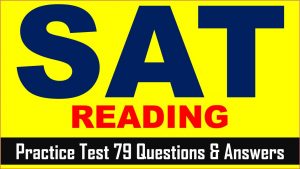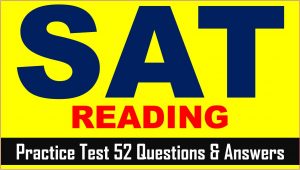SAT (Scholastic Assessment Test) is a standard test, used for taking admission to undergraduate programs of universities or colleges of the United States. SAT is developed and published by the College Board, an organization in the United States, administered by the Educational Testing Service. In this article of AKVTutorials, you will get SAT Reading Course Test 49 | SAT 2024 Online Tutor AMBiPi.
SAT Reading Practice Passage
Passage 1 is adapted from a speech delivered in 1898 by Albert J. Beveridge, “March of the Flag.” Passage 2 is adapted from a speech delivered in 1900 by William Jennings Bryan, “Imperialism.”
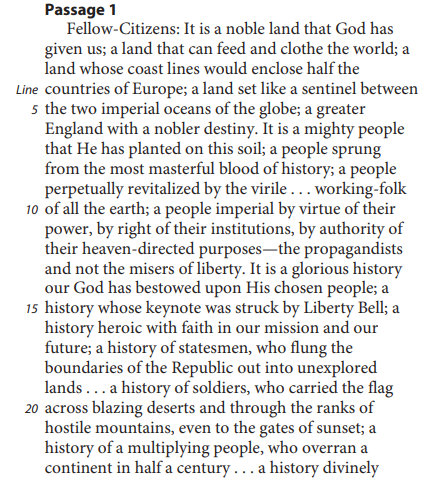
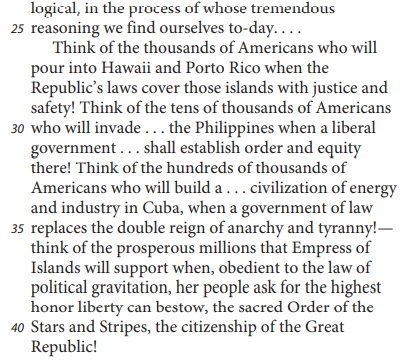
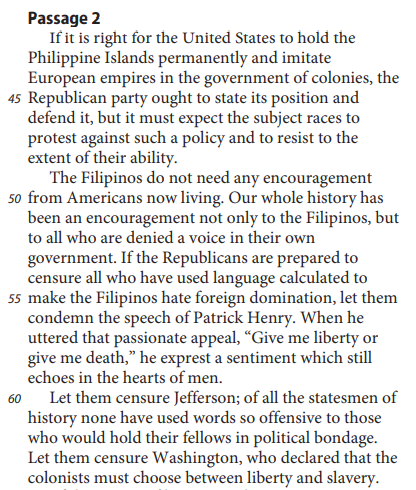
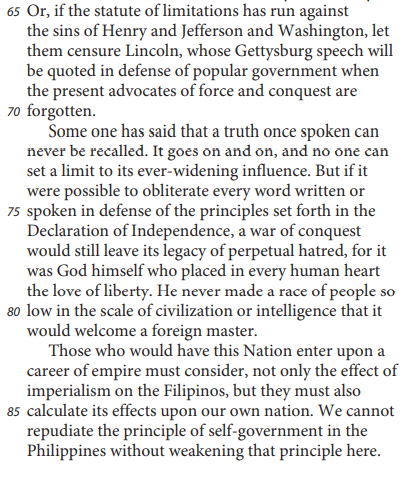
SAT Reading Comprehension Practice Test Questions
SAT Practice Test 49 Question No 1
In Passage 1, Beveridge asserts that the resources and immensity of the United States constitute a
Option A: safeguard against foreign invasion.
Option B: replication of conditions in Europe.
Option C: a divine gift to the American people.
Option D: source of envy for people in other countries.
SAT Practice Test 49 Answer No 1
Show/Hide Answer
Option C :
In the first paragraph of Passage 1, Beveridge portrays America as “a noble land that God has given us; a land that can feed and clothe the world; a land whose coastlines would enclose half the countries of Europe.” Thus, in Passage 1, Beveridge asserts that the resources and immensity of the United States constitute a divine gift to the American people.
Choice A is incorrect because Beveridge envisions Americans occupying foreign lands, not being subject to foreign invasion; moreover, he asserts that the resources and immensity of the United States constitute a divine gift, not a safeguard against invasion. Choice B is incorrect because Beveridge asserts that American society constitutes an improvement on English society, not that the resources and immensity of the United States replicate conditions in Europe. Choice D is incorrect because Beveridge doesn’t assert that the resources and immensity of the United States constitute a source of envy for people in other countries.
SAT Practice Test 49 Question No 2
In the second paragraph of Passage 1 (lines 26-41), the commands are given by Beveridge mainly serve to
Option A: remind the audience of its civic responsibilities.
Option B: anticipate the benefits of a proposed policy.
Option C: emphasize the urgency of a national problem.
Option D: refute arguments that opponents have advanced.
SAT Practice Test 49 Answer No 2
Show/Hide Answer
Option B :
In the second paragraph of Passage 1, Beveridge commands his audience several times to think of a future in which American laws and customs have been extended to foreign countries, leading American citizens to move to those places. According to Beveridge, this will provide Hawaii and Puerto Rico with “justice and safety,” the Philippines with “order and equity,” and Cuba with a “civilization of energy and industry.” Thus, in the second paragraph of Passage 1, the commands are given by Beveridge mainly serve to anticipate the benefits of a proposed policy.
Choices A, C, and D are incorrect because Beveridge’s commands serve to anticipate the benefits of a proposed foreign policy, not to remind the audience of its civic responsibilities (choice A), emphasize the urgency of a national problem (choice C), or refute an argument advanced by opponents (choice D).
SAT Practice Test 49 Question No 3
As used in line 72, “recalled” most nearly means
Option A: repeated.
Option B: retracted.
Option C: rejected.
Option D: remembered.
SAT Practice Test 49 Answer No 3
Show/Hide Answer
Option B :
The fourth paragraph of Passage 2 asserts that “a truth once spoken can never be recalled. It goes on and on, and no one can set a limit to its ever-widening influence.” In other words, when a true idea has been introduced to the world, it can never be retracted, or taken back. Therefore, in the context of the passage, the word “recalled” most nearly means retracted.
Choices A, C, and D are incorrect because in the context of the passage, “recalled” most nearly means retracted, not repeated (choice A), rejected (choice C), or remembered (choice D).
SAT Practice Test 49 Question No 4
It can reasonably be inferred from Passage 2 that Bryan considers the preference for national sovereignty over foreign rule to be a
Option A: reaction to the excesses of imperial governments in the modern era.
Option B: sign that the belief in human equality is widespread.
Option C: a testament to the effects of the foreign policy of the United States.
Option D: a manifestation of an innate drive in humans toward self-rule.
SAT Practice Test 49 Answer No 4
Show/Hide Answer
Option D :
In the fourth paragraph of Passage 2, Bryan argues that the principle of self-rule outlined in the Declaration of Independence is, in fact, a value that all people instinctively aspire to. Indeed, for Bryan, “[God] never made a race of people so low in the scale of civilization or intelligence that it would welcome a foreign master.” Therefore, it can reasonably be inferred from Passage 2 that Bryan considers the preference for national sovereignty over foreign rule to be a manifestation of an innate drive in humans toward self-rule.
Choices A and C are incorrect because it can reasonably be inferred that Bryan considers the preference for national sovereignty over foreign rule to be a manifestation of a universal drive in humans that’s independent of circumstances, not a reaction to the excesses of imperial governments in the modern era (choice A) or a testament to the effects of the foreign policy of the United States (choice C). Choice B is incorrect because Bryan indicates that a preference for self-rule is universal, not that belief in human equality is widespread.
SAT Practice Test 49 Question No 5
Which choice provides the best evidence for the answer to the previous question?
Option A: Lines 53-56 (“If the… Henry”)
Option B: Lines 72-73 (“It goes… influence”)
Option C: Lines 79-81 (“He never… master”)
Option D: Lines 82-85 (“Those… nation”)
SAT Practice Test 49 Answer No 5
Show/Hide Answer
Option C :
The previous question asks what can reasonably be inferred from Passage 2 about Bryan’s views on the preference for national sovereignty over foreign rule. The answer, that Bryan considers the preference to be a manifestation of innate drive-in humans toward self-rule are best supported in the fourth paragraph of Passage 2: “[God] never made a race of people so low in the scale of civilization or intelligence that it would welcome a foreign master.”
Choices A, B, and D are incorrect because the cited lines don’t provide the best evidence for the answer to the previous question. Instead, they indicate that explicitly promoting imperialism would run counter to the words of American founding father Patrick Henry (choice A), assert that once a truth is uttered, its influence will continually grow (choice B), and introduce the notion that, in Bryan’s view, an imperial project in the Philippines would hurt not only the people of that nation but also the people of the United States (choice D).
SAT Practice Test 49 Question No 6
As used in line 85, “calculate” most nearly means
Option A: evaluate.
Option B: design.
Option C: assume.
Option D: multiply.
SAT Practice Test 49 Answer No 6
Show/Hide Answer
Option A :
The last paragraph of Passage 2 states, “Those who would have this Nation enter upon a career of the empire must consider, not only the effect of imperialism on the Filipinos, but they must also calculate its effects upon our nation.” In other words, proponents of imperial conquest must evaluate, or assess, the consequences of this policy for the United States. Therefore, in the context of the passage, the word “calculate” most nearly means evaluate.
Choices B, C, and D are incorrect because in the context of the passage, “calculate” most nearly mean evaluate, not design (choice B), assume (choice C), or multiply (choice D).
SAT Practice Test 49 Question No 7
In developing their respective arguments, Beveridge (Passage 1) and Bryan (Passage 2) both express admiration for the
Option A: founding and history of the United States.
Option B: vibrancy and diversity of American culture.
Option C: worldwide history of struggles for independence.
Option D: idealism that permeates many aspects of American society.
SAT Practice Test 49 Answer No 7
Show/Hide Answer
Option A :
In the first paragraph of Passage 1, Beveridge references the founding and history of the United States as “a glorious history” that was bestowed upon God’s “chosen people,” a history heroic with faith in its mission and future, and “statesmen, who flung the boundaries of the Republic out into unexplored lands.” Similarly, in the second paragraph of Passage 2, Bryan declares, “Our whole history has been an encouragement . . . to all who are denied a voice in their government.” Bryan goes on to extol the virtues of several figures who were instrumental in the founding of the United States, including Thomas Jefferson and George Washington. Hence, in developing their respective arguments, Beveridge (Passage 1) and Bryan (Passage 2) both express admiration for the founding and history of the United States.
Choice B is incorrect because neither Bryan, in Passage 1, nor Beveridge, in Passage 2, expresses admiration for the vibrancy and diversity of American culture. Choice C is incorrect because Bryan expresses admiration for the worldwide history of struggles for independence, but Beveridge doesn’t. Choice D is incorrect because Beveridge expresses admiration for the idealism that permeates many aspects of American society, but Bryan doesn’t.
SAT Practice Test 49 Question No 8
Which choice best describes a central difference between how Beveridge (Passage 1) and Bryan (Passage 2) view the concept of liberty as it is realized in the United States?
Option A: Beveridge presents it as the direct inheritance of European colonization, whereas Bryan presents it as a sharp break from earlier governments in Europe.
Option B: Beveridge considers it so exemplary as to justify the conquest of other regions, whereas Bryan warns that its exemplary quality would be undermined by imperial expansion.
Option C: Beveridge argues that it arose organically as the United States matured, whereas Bryan argues that it was present from the country’s beginnings.
Option D: Beveridge regards it as a model that should be shared with other countries, whereas Bryan believes that it is unique to the United States and could not work elsewhere.
SAT Practice Test 49 Answer No 8
Show/Hide Answer
Option B :
In the first paragraph of Passage 1, Beveridge argues that Americans are “imperial under their power” and are therefore justified in being “the propagandists . . . of liberty.” In the second paragraph, he extols the benefits that will arise from the American administration of various island nations. Meanwhile, in the last sentence of Passage 2, Bryan cautions, “We cannot repudiate the principle of self-government in the Philippines without weakening that principle here”; in other words, imperial expansion by the United States would erode a key American value. Therefore, the difference between how the speakers view liberty as it is realized in the United States is that Beveridge considers it so exemplary as to justify the conquest of other regions, whereas Bryan warns that its exemplary quality would be undermined by imperial expansion.
Choice A is incorrect because Beveridge doesn’t present the concept of liberty as it’s realized in the United States as the direct inheritance of European colonization. Choice C is incorrect because Beveridge doesn’t argue that the concept of liberty as it’s realized in the United States arose organically as the country matured; instead, both Beveridge and Bryan emphasize the divinely inspired, intrinsic nature of the American concept of liberty. Choice D is incorrect because Bryan views the concept of liberty as it’s realized in the United States as encompassing a desire for self-rule and argues that this desire is universal and not unique to the United States.
SAT Practice Test 49 Question No 9
It can most reasonably be inferred from Passage 2 that Bryan would criticize the vision of American governance of island territories that Beveridge presents in Passage 1 for being
Option A: unrealistic, since most Americans would be unwilling to relocate to distant islands.
Option B: deceptive, since economic domination would be the true goal of the American government.
Option C: impractical, since the islanders would insist upon an equal distribution of resources.
Option D: naive, since the islanders would object to being governed by Americans.
SAT Practice Test 49 Answer No 9
Show/Hide Answer
Option D :
In Passage 1, Beveridge advocates for the American administration of island nations, such as the Philippines. However, in the first paragraph of Passage 2, Bryan warns, “If it is right for the United States to hold the Philippine Islands permanently and imitate European empires in the government of colonies, the Republican party . . . must expect the subject races to protest against such a policy and to resist to the extent of their ability.” Thus it can most reasonably be inferred from Passage 2 that Bryan would criticize the vision of American governance of island territories that Beveridge presents in Passage 1 for being naive since the islanders would object to being governed by Americans.
Choices A, B, and C are incorrect because, in Passage 2, Bryan doesn’t imply that Beveridge’s vision of American governance of island territories are unrealistic due to most Americans’ unwillingness to relocate to distant islands (choice A), deceptive because economic domination would be the true goal of the American government (choice B), or impractical due to the islanders’ insistence upon an equal distribution of resources (choice C).
SAT Practice Test 49 Question No 10
Which choice from Passage 2 provides the best evidence for the answer to the previous question?
Option A: Lines 42-48 (“If it… ability”)
Option B: Lines 49-50 (“The Filipinos… living”)
Option C: Lines 50-53 (“Our… government”)
Option D: Lines 56-59 (“When… men”)
SAT Practice Test 49 Answer No 10
Show/Hide Answer
Option A :
The previous question asks what criticism Bryan would most likely make of Beveridge’s vision of American governance of island territories. The answer, that Bryan would criticize this vision for being naive since islanders would object to being governed by Americans, is best supported by the first paragraph of Passage 2: “If it is right for the United States to hold the Philippine Islands permanently and imitate European empires in the government of colonies, the Republican party ought to state its position and defend it, but it must expect the subject races to protest against such a policy and to resist to the extent of their ability.”
Choices B, C, and D are incorrect because the cited lines don’t provide the best evidence for the answer to the previous question. Instead, they assert that the people of the Philippines don’t need encouragement from Americans to resist imperialism (choice B), state that American history encourages resistance to imperialism by all people, including the people of the Philippines (choice C), and note the enduring resonance of Patrick Henry’s famous quote about liberty (choice D).


